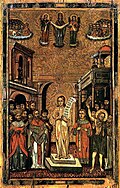Lawsuit
On January 25, 1997, Jeffery took his 12-year-old son to a Smashing Pumpkins concert at the New Haven Coliseum in New Haven, Connecticut. He initially planned to wait in a "parents room" but found it was in use by a warm-up act. He joined his son in the concert hall. It was the first rock concert he had attended. Although he wore ear plugs, at the close of the concert his left ear was ringing. He filed a lawsuit against the band, opening acts Fountains of Wayne and The Frogs, Virgin Records, the Coliseum, the city of New Haven, the ear-plug manufacturer, and the vendor he purchased the ear plugs from. [3] [4] [5]
This page is based on this
Wikipedia article Text is available under the
CC BY-SA 4.0 license; additional terms may apply.
Images, videos and audio are available under their respective licenses.
